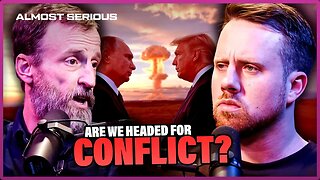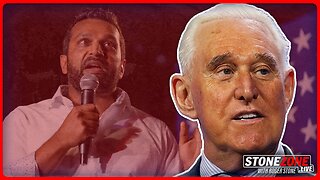Premium Only Content

Why do Governments Have to censor us ! , Combating Election Misinformation ? Meta Fact Checking
Government censorship in communist and socialist countries is often justified on the grounds of maintaining political stability, ensuring ideological conformity, and advancing the goals of the state. The importance attributed to censorship in these political systems stems from their underlying principles and the desire to control information to shape public opinion and protect the established order. While there can be variations among different countries and their specific approaches to censorship, some common themes underscore the perceived importance of censorship in communist and socialist contexts.
Ideological Control:
Communist and socialist ideologies often rely on a specific set of principles and beliefs that guide the state's policies and actions. Censorship is seen as a means to control the narrative and prevent the dissemination of information that contradicts or challenges the established ideology. This control helps in shaping a cohesive national identity and preventing the spread of dissenting views that may undermine the ruling party's authority.
Preserving Political Stability:
Governments in communist and socialist countries may argue that censorship is necessary to maintain political stability. The suppression of dissenting voices, opposition parties, or alternative political ideologies is seen as essential for preventing internal conflicts that could threaten the ruling regime. Censorship is viewed as a tool to suppress potential sources of unrest or rebellion.
State Security and National Interests:
Censorship is often justified in the name of state security and the protection of national interests. Information that is perceived as a threat to the state, whether it involves military secrets, sensitive diplomatic negotiations, or potential sources of internal unrest, may be subject to censorship. This is done under the premise of safeguarding the state from external and internal threats.
Control of Media and Information:
Communist and socialist governments frequently seek to control media outlets to ensure that they align with the state's ideology. Censorship helps regulate the content of newspapers, television, radio, and online platforms to prevent the spread of information that could challenge the ruling party's narrative. This control extends to cultural expressions, literature, and the arts as well.
Promotion of Social Harmony:
Censorship is often framed as a means to promote social harmony and cohesion. By suppressing content that may be deemed divisive or inflammatory, authorities aim to prevent the escalation of social tensions. This is particularly relevant in diverse societies where different ethnic, religious, or cultural groups coexist, and authorities may fear that certain information could exacerbate existing cleavages.
Centralized Planning and Economic Goals:
In some cases, censorship is linked to economic planning and the pursuit of socialist goals. Governments may control information about economic policies, performance, or challenges to present a positive image of their economic models. This can involve concealing information about economic difficulties or failures that may undermine confidence in the state-planned economic system.
While these justifications are often put forth by authorities in communist and socialist countries, it's important to note that censorship can have significant drawbacks. Critics argue that it stifles free expression, impedes the development of a well-informed citizenry, and can lead to a lack of innovation and adaptability in the face of changing circumstances. The tension between the perceived benefits of censorship for state control and the potential harm to individual freedoms is a central theme in discussions about political systems that employ censorship as a tool of governance.
#mikemartins #mikeinthenight
Government Censorship, Communist Regime, Socialist State, Political Stability, Ideological Control, National Security, Media Regulation, State Control, Information Suppression, Dissent Suppression, Social Harmony, Economic Planning, Propaganda, Authoritarianism, State Ideology, Political Control, Censorship Justifications, Information Control, Media Manipulation, Free Expression, National Interests, Cultural Regulation, State Security, Centralized Planning, Political Order, Ideological Conformity, Government Oversight, Dissent Management, Information Security, Political Suppression, Societal Control.
-
 1:15:26
1:15:26
Mike Martins Channel
9 days ago $0.06 earnedMike in the Night E531 - Lost Episode of Mike in the Night! , Kevin J Johnston
3943 -
 1:04:47
1:04:47
Candace Show Podcast
13 hours agoBecoming Brigitte: The Epilogue
114K142 -
 3:43:51
3:43:51
Alex Zedra
7 hours agoLIVE! Come Play WoT with me!
38.4K10 -
 5:22:49
5:22:49
Drew Hernandez
16 hours agoDOGE EXPOSES $2 BILLION SCHEME LINKED TO STACEY ABRAMS?!
65.4K45 -
 1:27:59
1:27:59
Kim Iversen
11 hours agoRFK Jr Declares No More Cheetos on Welfare? | Yale Confirms Long Covid Is Actually Vaccine Injury!
101K111 -
 1:08:43
1:08:43
The Charlie Kirk Show
8 hours agoTHOUGHTCRIME Ep. 74 — Charlie's Campus Return? Robo-Butlers? Garden of American Heroes?
81K18 -
 1:09:53
1:09:53
Slightly Offensive
8 hours ago $6.68 earnedIs the US Headed for MORE WAR Under TRUMP? | Guest: Scott Horton
46.7K11 -
 58:29
58:29
The StoneZONE with Roger Stone
8 hours agoRoger Stone Hails Confirmation of Kash Patel, Trashes Schiff for Attacks On Patel | The StoneZONE
53.4K20 -
 48:44
48:44
Man in America
13 hours agoA MASSIVE Global Financial Reset Is Coming—Are You Ready?
41.6K21 -
 1:15:42
1:15:42
Precision Rifle Network
1 day agoS4E5 Guns & Grub - The Best Rifle Under $2000
69K7